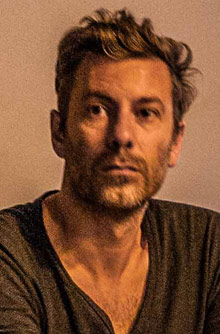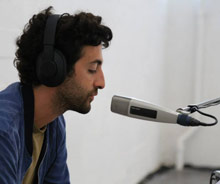Which language will I speak to you? Collective voice after the end of protest
Recent years have witnessed the largest protests in human history. Yet these mass mobilizations no longer change society. We've understood that attracting millions of people to the streets no longer guarantees the success of a protest. Now activism is at a crossroads: innovation or irrelevance.
Right now, activism needs fundamental reorientation in terms of language and tools. We have to re-imagine the script, the storyline and the ways of thinking about activism, social change and protest. The standard forms of protest have become part of the standard pattern and the key is to constantly innovate the way we protest and address social claims and propositions because otherwise it is as if protest is part of the script.
Starting from these assumptions the workshop is a shared moment of research and practices on strategies of taking and giving voice in the public and political sphere, starting from some urgent questions in the construction (as linguistic agent) of a collective consciousness.
Which theoretical frame do we need to preserve as root in a new process of creation of a shared language of mobilization? And how to use it?
How we can formalize a language that has a capacity to be effective and “popular” without loosing the complexity inherent in the global context?
How can we interfere in the visual and linguistic strategies that take place on a daily basis in the media sphere?
Can the creation of a fictional state be used as a transformation engine?
How can the artist and the artistic approach be relevant in the co-construction of such a language?
To address these issues we will work through theoretical and practical sessions which will feature lectures, discussions, writing and exercises. The module participants are also invited to consider the task of collective writing and performing.
SCHEDULE
September 19th
morning
Guided tour to Cittadellarte (Curated by Elena Rosina), including the Pistoletto, Arte Povera collections and temporary exhibitions.
Introduction to the Theorem of Trinamics, the symbol of the Third Paradise and the concept of Demopraxy.
afternoon
Group presentation.
Presentation of the mentor and the module.
Voice exercise: body resonance, collective voice and democratic conduction.
Sharing linguistic roots: E. Canetti, Crowds and Power (1960). Performative reading and discussion.
September 20th
morning
The Legislative Theatre (1998) by Augusto Boal: practical exercises and applications.
Brainstorming, keywords, collective discussion.
afternoon
The individual and the collective voice. The greek choir and examples of contemporary artistic experiences in political chorality.
Voice and body exercise.
Sharing linguistic roots: propositions by the group.
September 21st
A day with the guest Daniel Blanga Gubbay.
morning
The problem of neutralisation of protest. An analysis of the 2011-2012 movement through a reading of The Suspension of Historical Time (1969) by Furio Jesi and Public sphere by performance (2015) by B. Cvejic & A.Vujanovic.
afternoon
What Guy Debord can teach us about protest? How score and fiction can be effective strategies of transformation of the real?
September 22nd
morning
Analysis of visual tools and group dynamics in the historical and recent protest.
Imaginative strategies.
Exercises: Newspaper theatre. From the mask of protest to the mask of resonance.
afternoon
Sharing linguistic roots: exercise of writing and preparation of a rithmic score. Performing the prepared political score.
September 23th
morning
Individual work: projects of a political action in the public space.
afternoon
Final discussion and presentation of the works/ texts/ documents / actions produced during the workshop sessions.
evening
Party.
REFERENCES
The mentor will prepare a reader for participants with key texts some of which will be discussed during the week.
• A. Boal, The Legislative Theatre, Routledge, 1998
• A. Boal, Games for actors and non actors, Routledge, 2002
• E. Canetti, Crowds and Power, Farrar, Straus and Giroux, 1984
• B. Cvejic & A.Vujanovic, Public Sphere by Performance, TkH, 2012
• G. Debord, International Situationist Manifesto, 1960
• F. Jesi, The Suspension of Historical Time, Hatje Cantz, 1969
• E. Laclau, On Populist Reason, Verso Book, 2007
• M. White, The End of Protest, Penguin Random House of Canada, 2016

BIOGRAPHY
Luigi Coppola is an Italian artist who works within the fields of performance, video and public art projects. Through his research he develops social choreographies as democratic models, partecipative and collaborative practices, politically motivated actions, bringing to front a notion of art practice as mise en forme of political, economic, social issues and claims. He is currently involved in a project aiming at the common reorganization of the political, agricultural and economic systems of a entire village in the south of Italy and in long term projects on “political chorality” in different places in Europe.
He created projects, performances, projects and exhibitions in different international contexts such as 1st Democracy Biennale, Turin; Nomas Foundation, Rome; Kadist Art Foundation, Paris; Teatro Valle Occupato, Rome; Wiener Festwochen, Vienna; Maxxi Museum, Rome; Extra City, Antwerpen; Madre Museum, Naples; New Langton Art, San Francisco; Galleria Lungomare (in the frame of “Manifesta 7” and Lungomare Gasthaus), Bolzano; Santarcangelo Festival, Santarcangelo di Romagna; Wunder der Prärie, Mannheim; Fabbrica Europa Festival, Florence.
He was with Michelangelo Pistoletto joint artistic curator of the “Urban Art Biennale” in Bordeaux (FR) and was part of the knowledge circle “Art in Society” directed by Pascal Gielen at the Fontys University (NL).
Links on Luigi Coppola projects
• Luigi Coppola blog: luiscoppola.blogspot.com
• Casa delle Agriculture (Lecce): https://casadelleagriculture.wordpress.com/
• A- Head project: http://iointesta.tumblr.com/
• Biennale of urban art Bordeaux: http://evento2011.com/en
• Democratic Acts project: www.attidemocratici.org

GUEST
Daniel Blanga-Gubbay (1982) is a Brussels-based researcher in political philosophy of the arts. After graduating in philosophy from the Venice University of Architecture with Giorgio Agamben, and while working with him, he got a European Ph.D. in Cultural Studies, jointly run by the University of Palermo, Valencia and Freie Unversität Berlin. He was the creator of the artistic project Pathosformel (2007-2014) and got a post-doc at the Heinrich Heine Universität in Düsseldorf, within a project on the use of the concept of possible in art and politics. He is current professor at Académie Royale des Beaux Arts in Brussels and collaborates with the Kunstenfestivaldesarts and LiveWorks. He is the founder of Aleppo (www.aleppo.eu), a space for researches in political philosophy in collaboration with art institutions.
The residency fee includes accomodation and half-board.
